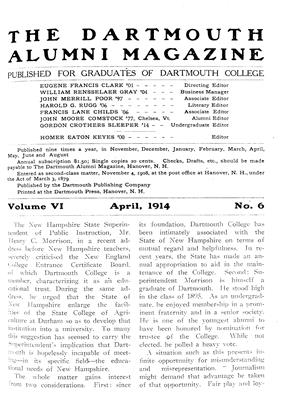To determine what effect the various activities of undergraduate life have on scholarship, Professor Husband, freshman class officer, has just completed an analysis of the scholarship of the class of 1917. This study resulted in some very interesting findings, among them being the shattering of the old belief that the students who attain high rank in college rarely interest themselves m any outside concerns of undergraduate hie. Professor Husband writes in The Dartmouth regarding the results of his investigation as follows:
"The investigation was confined, on the one hand, to those men who were Subject to college discipline: that is, to those who were separated from College, and. those put on probation, and, at the upper end of the class, to those who had attained a rank of at least 75%.
"Perhaps the most striking thing about the result of the investigation is the discovery of the fact that the activities of the men of high rank are-more representative of the total activities of the College, than those of lowrank men. There is scarcely a place where they do not figure, while men at the lower end of the class, on the contrary, practically confine their activities to athletics, and to athletics of the more vigorous kind.
"The new athletic ruling removed many men from squads early in the season, whereas men of high rank remained active all the time. But as the object was to ascertain where the interest of students lay, all were listed, even if they remained on squads for only a few days.
"The total number of men who attained an average of 85% or more was 10. Of these, there were 6, or 60%, engaged in thirteen activities. The ratio of activities to the number of men involved is 130%. Their activities were: baseball 2, tennis 2, debating 2, dramatics, glee club, outing club, hockey, track, The Dartmouth, orchestra, 1 each.
"The total number of men who attained an average rank of 80 to 85% was 15. Of these there were 9, or 60%, engaged in thirteen outside activities. The ratio of activities to the number of men involved is 87%. Their activities were: track 2, tennis 2, D. C. A. 2, golf, dramatics, boxing, basketball, debating, outing .club, church work, 1 each.
"The number of men who attained an average of 75 to 80% was 47. Of these there were 24, or 51%, engaged in thirty activities outside. The ratio of activities to the total number of men is 64%. Their activities were: football 7, baseball 5, basketball 4, speaking 3, TheDartmouth 3, tennis 2, music 2, debating, Jack O'Lantern, orchestra, track, 1 each.
"There were 23 men separated from College, of whom 11, or 47% were engaged in fifteen outside activities. The ratio of activities to the total number of men is 69%. Their activities were-football 3, baseball 2, cross-country 2 basketball 2, track 2, hockey, band' choir, dramatics, 1 each.
"There were 35 men put on probation, of whom 19, or 54%, were engaged in 21 activities. The ratio in this case is 60%. The activities were: football 10, track 6, cross-country 3, baseball, 2.
"Of the total number of men subject to discipline, 52% were engaged in outside activities, as against 54% of the men of high rank. The activities of disciplined men bears the ratio of 60% to that of the whole number of men, while the percentage is 78 for the men of high, rank."
 View Full Issue
View Full Issue
More From This Issue
-
 Article
ArticleMEETING OF DARTMOUTH SECRETARIES
April 1914 By W. Gray Knapp '12 -
 Article
ArticleThe New Hampshire State Superintendent of Public Instruction,
April 1914 -
 Article
ArticleIN MEMORY OF PROFESSOR CHARLES F. RICHARDSON
April 1914 -
 Class Notes
Class NotesLOCAL ASSOCIATIONS
April 1914 -
 Article
ArticleNOMINATIONS FOR ALUMNI TRUSTEE
April 1914 -
 Article
ArticleDARTMOUTH THEN AND NOW
April 1914
Article
-
 Article
ArticleRESEARCH GRANT TO DR. JUST '07
July 1920 -
 Article
ArticleAMOS TUCK SCHOOL CLEARING HOUSE"
June 1925 -
 Article
ArticleIvy League Champs
DECEMBER 1970 -
 Article
ArticleEastern Massachusetts
JUNE 1977 -
 Article
ArticleDr. Wheelock's Journal
December 1989 -
 Article
ArticleA Growing Interest in the Humanities
April 1937 By ADDISON M. PARKER JR. '37


